Intro
Discover the ultimate Prenatal Screening Tests Guide, covering non-invasive tests, genetic screenings, and diagnostic procedures for a healthy pregnancy, including risk assessments and baby development monitoring.
Prenatal screening tests are an essential part of pregnancy care, providing valuable information about the health and development of the fetus. These tests can help identify potential issues early on, allowing for timely interventions and improving outcomes for both the mother and the baby. With the advancement of medical technology, prenatal screening tests have become more accurate and comprehensive, offering a range of options for expectant parents. In this article, we will delve into the world of prenatal screening tests, exploring their importance, types, and benefits, as well as providing guidance on what to expect during these tests.
Prenatal screening tests are typically performed during the first and second trimesters of pregnancy, with some tests available as early as 10 weeks. These tests can detect a range of conditions, including genetic disorders, chromosomal abnormalities, and fetal anomalies. By identifying potential issues early on, healthcare providers can develop a plan to manage and treat any conditions that may arise, reducing the risk of complications and improving the overall health of the mother and the baby. Moreover, prenatal screening tests can also provide valuable information about the fetus's growth and development, helping expectant parents prepare for the arrival of their baby.
The importance of prenatal screening tests cannot be overstated, as they offer a unique opportunity for expectant parents to gain insight into their baby's health and development. By undergoing these tests, parents can make informed decisions about their pregnancy, receive timely medical interventions, and develop a plan for their baby's care. Furthermore, prenatal screening tests can also help identify potential risks and complications, allowing healthcare providers to take proactive steps to mitigate these risks and ensure the best possible outcomes. With the help of prenatal screening tests, expectant parents can enjoy a healthier and more informed pregnancy, setting the stage for a happy and healthy arrival.
Prenatal Screening Tests Overview
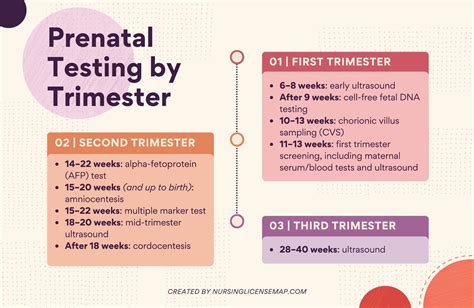
Types of Prenatal Screening Tests
Prenatal screening tests can be further divided into several subcategories, each with its own unique benefits and purposes. Some common types of prenatal screening tests include: * First-trimester screening: This test is typically performed between 11 and 14 weeks of pregnancy and involves a combination of ultrasound and blood tests to detect potential chromosomal abnormalities. * Second-trimester screening: This test is typically performed between 15 and 20 weeks of pregnancy and involves a combination of ultrasound and blood tests to detect potential fetal anomalies and chromosomal abnormalities. * Non-stress test: This test measures the fetus's heart rate in response to movement, providing valuable information about the fetus's health and well-being. * Biophysical profile: This test uses ultrasound to evaluate the fetus's movement, tone, and breathing, providing a comprehensive assessment of the fetus's health and development.Prenatal Screening Tests Benefits
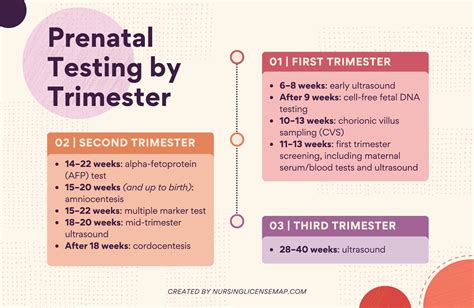
Prenatal Screening Tests Risks and Limitations
While prenatal screening tests offer numerous benefits, they also carry some risks and limitations. Some common risks and limitations include: * False positives: Some prenatal screening tests can produce false positive results, which can cause unnecessary anxiety and stress for expectant parents. * False negatives: Some prenatal screening tests can produce false negative results, which can provide a false sense of security and potentially delay necessary medical interventions. * Invasive procedures: Some prenatal screening tests, such as amniocentesis and chorionic villus sampling, carry a small risk of miscarriage and other complications. * Emotional distress: Prenatal screening tests can be emotionally challenging, especially if the results indicate a potential issue with the fetus's health.Prenatal Screening Tests Preparation
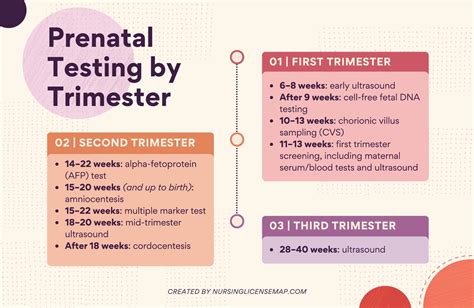
Prenatal Screening Tests Results
The results of prenatal screening tests can be complex and may require interpretation by a healthcare provider. Some common results include: * Normal: The test results indicate that the fetus is healthy and developing normally. * Abnormal: The test results indicate a potential issue with the fetus's health, such as a chromosomal abnormality or fetal anomaly. * Inconclusive: The test results are unclear or inconclusive, requiring further testing or evaluation. * High-risk: The test results indicate a higher risk of complications or issues with the fetus's health, requiring closer monitoring and medical interventions.Prenatal Screening Tests Follow-up
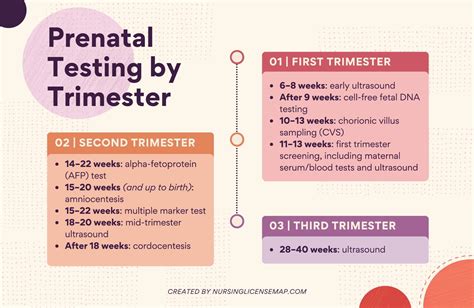
Prenatal Screening Tests and Pregnancy Complications
Prenatal screening tests can help identify potential complications and risks during pregnancy, allowing for timely medical interventions and improving outcomes for both the mother and the baby. Some common pregnancy complications that can be detected through prenatal screening tests include: * Gestational diabetes: A condition characterized by high blood sugar levels during pregnancy. * Preeclampsia: A condition characterized by high blood pressure and damage to organs such as the kidneys and liver. * Placental abruption: A condition characterized by the placenta separating from the uterus, potentially depriving the fetus of oxygen and nutrients. * Umbilical cord prolapse: A condition characterized by the umbilical cord prolapsing into the birth canal, potentially depriving the fetus of oxygen and nutrients.Prenatal Screening Tests and Fetal Development
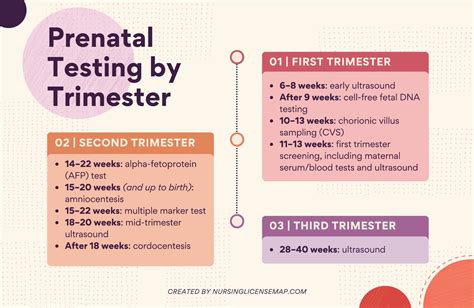
Prenatal Screening Tests and Parental Involvement
Prenatal screening tests offer a unique opportunity for expectant parents to become involved in their baby's care and development. By undergoing these tests, parents can: * Gain a deeper understanding of their baby's health and development. * Develop a plan for their baby's care, including any necessary medical interventions or special care. * Make informed decisions about their pregnancy, including any necessary medical interventions or lifestyle changes. * Build a stronger bond with their baby, fostering a sense of connection and attachment.What are prenatal screening tests?
+Prenatal screening tests are medical tests performed during pregnancy to detect potential risks and abnormalities in the fetus.
What are the benefits of prenatal screening tests?
+The benefits of prenatal screening tests include identifying potential risks and abnormalities early on, developing a plan for the baby's care, and gaining valuable information about the fetus's growth and development.
What are the risks and limitations of prenatal screening tests?
+The risks and limitations of prenatal screening tests include false positives, false negatives, invasive procedures, and emotional distress.
In conclusion, prenatal screening tests are a vital part of pregnancy care, providing valuable information about the health and development of the fetus. By understanding the different types of prenatal screening tests available, their benefits and limitations, and how to prepare for and follow up on these tests, expectant parents can make informed decisions about their pregnancy and receive timely medical interventions. As we continue to advance our understanding of prenatal screening tests and their applications, it is essential to prioritize the health and well-being of both the mother and the baby, ensuring the best possible outcomes for all. We invite you to share your thoughts and experiences with prenatal screening tests, and to explore the various resources and support available to expectant parents. Together, we can work towards a healthier and more informed pregnancy, setting the stage for a happy and healthy arrival.
